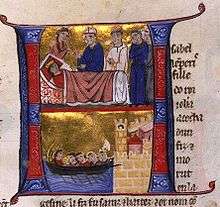Isabella II of Jerusalem
| Yolande/Isabella II | |
|---|---|
 The death of Queen Isabella-Yolande (From MS of William of Tyre's Historia and Old French Continuation, painted in Acre, 13C. Bib. Nat. Française) | |
| Queen of Jerusalem | |
| Reign | 1212 – 25 April 1228 |
| Predecessor | John and Maria |
| Successor | Conrad II |
| Holy Roman Empress; Queen consort of Sicily | |
| Tenure | 1225 – 25 April 1228 |
| Born | c. 1212 |
| Died |
25 April 1228 (aged 15–16) Andria, Italy |
| Burial | Andria Cathedral |
| Spouse | Frederick II, Holy Roman Emperor |
| Issue | Conrad II of Jerusalem |
| House | House of Brienne |
| Father | John of Brienne |
| Mother | Maria of Montferrat |
Isabella II (1212 – 25 April 1228) also known as Yolande of Brienne, was a princess of French origin who became monarch of Jerusalem.
Infant Queen
Isabella II was born in Andria, in the southern Italian Kingdom of Sicily. She was the only child of Maria of Montferrat, Queen of Jerusalem, and John of Brienne.[1] Maria was the daughter of Queen Isabella I of Jerusalem by her second husband Conrad I, and heiress, on her mother's death, of the Kingdom of Jerusalem.
Maria died shortly after giving birth to Isabella II in 1212,[2] possibly by puerperal fever. Because of this, Isabella II was proclaimed Queen of Jerusalem when she was only a few days old. Because her father John did not have a direct claim on the throne, he ruled as regent.
Marriage with Frederick II

During a meeting between John of Brienne, the Pope Honorius III and Frederick II in the city of Ferentino in 1223, Isabella's fate was decided: Frederick accepted to finally go to the Crusade, but only as the legitimate King of Jerusalem, and this was only possible if he agreed to take the young Queen Isabella II as his wife (by this time, Frederick was a widower).[3] This was planned by the Pope, who hoped by this bond to attach the Emperor firmly to the Sixth Crusade. The betrothal was confirmed, but the Emperor still delayed his departure until August 1225, when he and Isabella were married by proxy in the City of Acre.[4] Days later, Isabella II was crowned as Queen of Jerusalem.
Isabella arrived in Italy with twenty galleys sent by Frederick II to bring her to her father and married in person to Frederick II in the cathedral of Brindisi, on 9 November 1225.[5] During the ceremony, Frederick declared himself King of Jerusalem and immediately saw to it that his new father-in-law John of Brienne, the current regent of Jerusalem, was dispossessed and his rights transferred to him. The contemporary chronicles described the exotic wedding celebrations, which took place in the Castle of Oria, and the indignant reaction of her father John of Brienne, now without royal authority.
Death
After the wedding, Isabella was kept in seclusion by her husband, in Palermo.[5] In November 1226, she gave birth to her first child, a daughter (referred to by some sources as Margaret); the baby died in August 1227. Isabella died 4 May after giving birth to her second child, a son, Conrad, in Andria, Bari, on 25 April 1228.[5] She was buried in the Andria Cathedral.
Ancestry
| Ancestors of Isabella II of Jerusalem | ||||||||||||||||||||||||||||||||||||||||||||||||||||||||||||||||||||||||||||||||||||||||||||||||||||||||||||||||||||||||||||||||||||||||||||||||||||||||||||||||||||||||||||||||||||||||||||||||||||||||||||||||||||||||||||||||||||||||||||||||||||||||||||||||||||||||||||||||||||||||||||||||||||||||||||||||||||||||||||||||||||||||||||||||||||||||||||||||||||||||||||||||||||||||||||||||||||||||||||||||||||||||||||||||||||||||||||||||||||||||||||||||||||||||||||||||||||||||||||||||||||||||||||
|---|---|---|---|---|---|---|---|---|---|---|---|---|---|---|---|---|---|---|---|---|---|---|---|---|---|---|---|---|---|---|---|---|---|---|---|---|---|---|---|---|---|---|---|---|---|---|---|---|---|---|---|---|---|---|---|---|---|---|---|---|---|---|---|---|---|---|---|---|---|---|---|---|---|---|---|---|---|---|---|---|---|---|---|---|---|---|---|---|---|---|---|---|---|---|---|---|---|---|---|---|---|---|---|---|---|---|---|---|---|---|---|---|---|---|---|---|---|---|---|---|---|---|---|---|---|---|---|---|---|---|---|---|---|---|---|---|---|---|---|---|---|---|---|---|---|---|---|---|---|---|---|---|---|---|---|---|---|---|---|---|---|---|---|---|---|---|---|---|---|---|---|---|---|---|---|---|---|---|---|---|---|---|---|---|---|---|---|---|---|---|---|---|---|---|---|---|---|---|---|---|---|---|---|---|---|---|---|---|---|---|---|---|---|---|---|---|---|---|---|---|---|---|---|---|---|---|---|---|---|---|---|---|---|---|---|---|---|---|---|---|---|---|---|---|---|---|---|---|---|---|---|---|---|---|---|---|---|---|---|---|---|---|---|---|---|---|---|---|---|---|---|---|---|---|---|---|---|---|---|---|---|---|---|---|---|---|---|---|---|---|---|---|---|---|---|---|---|---|---|---|---|---|---|---|---|---|---|---|---|---|---|---|---|---|---|---|---|---|---|---|---|---|---|---|---|---|---|---|---|---|---|---|---|---|---|---|---|---|---|---|---|---|---|---|---|---|---|---|---|---|---|---|---|---|---|---|---|---|---|---|---|---|---|---|---|---|---|---|---|---|---|---|---|---|---|---|---|---|---|---|---|---|---|---|---|---|---|---|---|---|---|---|---|---|---|---|---|---|---|---|---|---|---|---|---|---|---|---|---|---|---|---|---|---|---|---|---|---|---|---|---|---|---|---|---|---|---|---|---|---|---|---|---|---|---|---|---|---|---|---|---|---|---|---|---|---|---|---|---|---|---|---|---|---|---|---|---|---|---|---|---|---|---|---|---|---|---|---|---|---|---|---|---|---|---|---|---|---|---|---|---|---|---|---|---|---|---|---|---|---|---|---|
| ||||||||||||||||||||||||||||||||||||||||||||||||||||||||||||||||||||||||||||||||||||||||||||||||||||||||||||||||||||||||||||||||||||||||||||||||||||||||||||||||||||||||||||||||||||||||||||||||||||||||||||||||||||||||||||||||||||||||||||||||||||||||||||||||||||||||||||||||||||||||||||||||||||||||||||||||||||||||||||||||||||||||||||||||||||||||||||||||||||||||||||||||||||||||||||||||||||||||||||||||||||||||||||||||||||||||||||||||||||||||||||||||||||||||||||||||||||||||||||||||||||||||||||
Notes
- ↑ Steven Runciman, A History of the Crusades, Volume III: The Kingdom of Acre and the Later Crusades, (Cambridge University Press, 1989), 134.
- ↑ Guy Perry, John of Brienne: King of Jerusalem, Emperor of Constantinople, c.1175-1237, (Cambridge University Press, 2013), 68.
- ↑ David Abulafia, Frederick II: A Medieval Emperor, (Oxford University Press, 1988), 150.
- ↑ The proxy marriage was performed by Giacomo, Bishop of Patti (Riccardo di San Germano, Cronaca).
- 1 2 3 Jaroslav Folda, Crusader Art in the Holy Land, From the Third Crusade to the Fall of Acre, (Cambridge University Press, 2005), 148.
References
| Wikimedia Commons has media related to Yolande of Jerusalem. |
- Uwe A. Oster: Die Frauen Kaiser Friedrichs II, Piper, Munich 2008.
- Alberto Gentile: LE QUATTRO MOGLI DI FEDERICO II: FRA MITO E REALTÀ (Italian) in stupormundi.it [retrieved 22 May 2014].
| Regnal titles | ||
|---|---|---|
| Preceded by Maria |
Queen of Jerusalem 1212–1228 |
Succeeded by Conrad II |
| Royal titles | ||
| Preceded by Constance of Aragon |
Queen consort of Sicily 1225–1228 |
Succeeded by Isabella of England |
| Holy Roman Empress Queen consort of Germany 1225–1228 | ||
.svg.png)